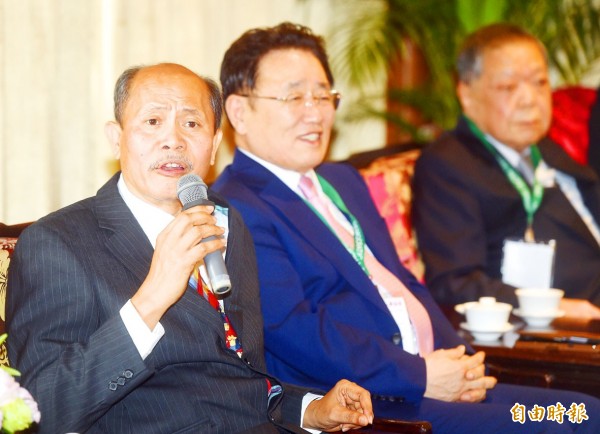《TAIPEI TIMES》 Regional cooperation urged at forum

Gusi Peace Prize Foundation founder Barry Gusi, left, speaks at the East Asia Peace Forum in Taipei yesterday as 21st Century Economic and Social Research Institute chairman Yoo Joon-sang, center, and Japanese political commentator Hideaki Kase look on. Photo: Chien Jung-fong, Taipei Times
APPEAL: A Japanese participant said Taiwan, the US, Japan, South Korea, Vietnam and the Philippines need to cooperate more closely on China and North Korea
/ Staff writer, with CNA
Taiwanese lawmakers joined their colleagues from Japan, South Korea and the Philippines yesterday in Taipei calling for greater cooperation in maintaining regional peace and stability in the face of threats from China and North Korea.
Enhancing cooperation between Taiwan, the US, Japan, South Korea, Vietnam and the Philippines — especially in the area of information sharing — to counter Beijing’s influence is critical to the surveillance of China’s actions in the region, Japanese House of Representatives member Keisuke Suzuki told the East Asia Peace Forum.
That Chinese President Xi Jinping’s (習近平) could invade Taiwan is a “real threat,” the four-term lawmaker and member of the Liberal Democratic Party said.
China is a dictatorship where Xi’s legitimacy is contingent on whether he can create welfare and economic benefits for the people and deliver the “China dream,” Suzuki said on the second day of the forum, which was initiated by former vice president Annette Lu (呂秀蓮).
However, China faces some problems linked to its rapidly aging population, its failure to upgrade its economic structure to a modern, innovative system and its sagging domestic market, he said.
Xi’s Belt and Road Initiative aims to open emerging markets for China’s mid-range products and he has become more hawkish about making China a dominant regional power that can outflank the US in a bid to ensure his legitimacy in China, Suzuki said.
That is why Taiwan, the US, Japan, South Korea, Vietnam and the Philippines need to cooperate more closely, particularly in the area of information sharing, Suzuki said.
Philippine Representative Rose Marie Arenas, chair of the Philippine House of Representatives Committee on Inter-Parliamentary Relations and Diplomacy, called for Taiwan’s inclusion in regional dialogue.
Taiwan is not an ASEAN member or a dialogue partner of the East Asia Summit, but “without Taiwan, any regional forum will be inadequate since Taiwan is one of the most important economies of the Asia-Pacific region,” she said.
Democratic Progressive Party Legislator Lo Chih-cheng (羅致政) said Taiwan remains committed to peace and stability in the region under the order maintained by the US and its allied system over the past six decades.
In line with Xi’s dream to make China a regional hegemonic power, China has been incrementally threatening the existing order, using not only its growing military strength, but also economic means, Lo said.
“A strong but smart China is a real threat to the region,” Lo said. “China has used its huge market to impose restraints on other countries’ policies toward China. Even worse, some countries have imposed restraints on themselves.”
In the face of the China threat, like-minded nations should institutionalize and regularize dialogue to coordinate strategies in response to the region’s changing dynamics, he said.
South Korean lawmaker Lee Ju-young from the Saenuri Party said North Korea’s nuclear threat eclipses other security issues in the region and is the precondition to solving all relevant issues.
The first priority of East Asian nations should be “sharing our awareness of the North’s nuclear threat,” Lee said, urging other attendees to pool their resources to make North Korea give up its nuclear weapons.
Lee also called for careful discussion among allies over redeployment of US nuclear weapons, which were deployed in South Korea in the late 1950s and withdrawn in the early 1990s, to help cope with Pyongyang’s blackmail tactics.
“Some might worry about nuclear liberation across East Asia, but I am certain that the redeployment will serve as a powerful means of pressure, along with the current economic financial and diplomatic sanctions, and effectively drive the North to abandon nuclear weapons,” he said.
新聞來源:TAIPEI TIMES


















